Media Centre - Media release - 11 October 2018
New report highlights alarming levels of harassment and abuse of girls and young women in cities: Plan International

From masturbation in public to being groped and sexually assaulted, girls are suffering relentless harassment and abuse in cities worldwide, a new report from child rights organisation Plan International reveals.
Unsafe in the City, which was based on more than 21,000 testimonials of girls and young women living in Delhi, Kampala, Lima, Madrid and Sydney, found that in all five cities, boys and men grope, chase, stalk, leer at, verbally insult, and flash girls and young women.
It found this behaviour is condoned by society with authorities rarely taking action, and bystanders usually doing just that – standing by. This forces girls to adjust their behaviour to protect themselves.
CEO of Plan International Australia, Susanne Legena, said the groundbreaking research provided a previously unseen glimpse of the impact of harassment and abuse on the lives of girls and young women.
“Constant harassment and abuse is frightening and draining, and leaves young women feeling completely disempowered. This indifference and inaction leads many girls and young women to blame themselves for abuse and harassment,” she said.
“What’s more, by forcing girls and women to constantly adjust their behaviour to stay safe, society is denying them the benefits and opportunities of city life. Their access to work and study opportunities, and their ability to enjoy the city, is restricted.
“The idea that all around the world – in cities like Delhi, Lima, Kampala, Madrid and Sydney – girls are being pulled out of school, quitting their jobs or moving because of the harassment and abuse they are subjected to by men is completely unacceptable.”
The research was carried out using an online mapping tool developed by Plan International, in partnership with Melbourne digital consultancy CrowdSpot and researchers at Monash University’s XYX Lab, specialists in gender-sensitive design practice and theory. The tool was piloted in Melbourne in 2016.
It found that in all five cities, girls and young women noted on the map that harassment and other forms of abuse are so common that they perceive it as normal.
The data showed girls feel there is little point in reporting harassment to the authorities because they either don’t have the will or power to act.
Dr Nicole Kalms, director of Monash University’s XYX Lab, said the results showed that the harassment of girls and young women transcends geography: “Across five cities, the safety concerns of these young women are frighteningly similar, with the prevalence of sexual harassment in particular standing out,” she said.
One 28-year-old woman said she had just left Sydney after spending five years studying there.
“Both love and hate for the city, as a female, especially an Asian female with curves. I never felt safe in this city. I get sexual harassment (catcalling, swears, pervert stares) almost everywhere I go. No matter how much I cover myself with hideous clothes, this never stops.”
In Lima, a 23-year-old woman shared a disturbing experience she had when she was still underage.
“I was sitting on the lawn. When I turned around, a man had his penis out. He was masturbating, looking at me, sitting on a bench in plain sight and ignored by all. Nobody did anything.”
The report highlights three key recommendations made by women and girls to ensure cities become safer, more accountable and more inclusive places to live:
- Men and boys need to recognise that sexist behaviour is intolerable and learn to respect girls and women as their equals;
- Girls and young women should be supported to become involved in co-designing their cities, including infrastructure, the provision of services and the policies that govern them;
- Governments must adopt and implement laws and policies that criminalise all forms of gender-based violence, including sexual harassment.
Ms Legena said the time to act is now.
“The level of danger girls are facing in cities is shocking and we all have a role to play in ensuring everybody feels safe in our cities – whether they’re on the street, on public transport or in parks. Individuals, communities, governments and authorities should all be spurred to act.”
Notes to Editors:
- Girls and young women participating in the research were encouraged to use the web-based map of their city by dropping a purple ‘good’ pin on areas where they felt safe and an orange ‘bad’ pin on the locations where they felt unsafe or uncomfortable. They could then provide a description as to why they like or dislike that part of the city, including details any incidents they experienced there. All responses were anonymous.
- Plan International runs its Safer Cities for Girls programme in three of the cities which participated in the research – Lima, Kampala and Delhi – and also in Cairo, Nairobi, Hanoi, San Francisco, Asunción in Paraguay and Honiara, Solomon Islands. The programme aims to build safe, accountable and inclusive cities with and for adolescent girls.
About Plan International
Plan International is an independent development and humanitarian organisation that advances children’s rights and equality for girls.
We believe in the power and potential of every child. But this is often suppressed by poverty, violence, exclusion and discrimination. And it’s girls who are most affected. Working together with children, young people, our supporters and partners, we strive for a just world, tackling the root causes of the challenges facing girls and all vulnerable children.
We support children’s rights from birth until they reach adulthood. And we enable children to prepare for – and respond to – crises and adversity. We drive changes in practice and policy at local, national and global levels using our reach, experience and knowledge.
We have been building powerful partnerships for children for over 75 years, and are now active in more than 70 countries.
About Monash University’s XYX Lab
XYX Lab is a team of experienced design researchers exploring gender-sensitive design practices and theory based at Monash University’s Art, Design and Architecture faculty. Their work operates at the intersection of gender, identity, urban space and advocacy. Through their work, they bring together planners, policy makers, local government and stakeholders to make tangible the experiences of underrepresented communities in urban space and planning.
Media contacts

